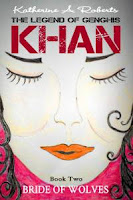Year of the Monkey - 12th Century style
 The Chinese Year of the Monkey begins this week, and so does the Mongolian Tsaagan Sar festival celebrating the Year of the Fire Monkey.
The Chinese Year of the Monkey begins this week, and so does the Mongolian Tsaagan Sar festival celebrating the Year of the Fire Monkey.To me, monkeys always seem playful and mischievous. So perhaps this is an auspicious year for an author who has always gone the traditional route with her children's books to take things into her own monkey-hands (or, more accurately, tiger-paws since I was born in the Year of the Tiger) and publish a mischievous little trilogy of novellas for older readers about Genghis Khan. For those who have heard the name but know little else, Genghis (or Temujin, his boyhood name) came from humble beginnings in the 12th century to unite the 'people who live in felt tents' under a single banner. With his infamous Mongol hordes, he then went on to conquer much of Asia and Europe, building an empire four times the size of Alexander the Great's.
Rather than take the usual epic historical route chronicling the Khan's conquests, my Legend of Genghis Khan series concentrates on Temujin's early years and aims to bring out the spiritual side of his life... the animal spirits that haunted the steppes, his people's belief in their first Ancestors Blue Wolf and Fallow Doe, and the powerful shamans who played violins fashioned from the skulls of horses (a forerunner of the traditional morin khur Mongolian fiddle) to call on such spirits.
Closely connected with the spiritual side of Genghis Khan's life is the romance between young Temujin and his first wife Borta, and his relationship with his anda (blood brother) Jamukha. Each novella is written from the point of view of a different character in the legend and covers the same twelve year animal cycle - Hare, Dragon, Snake, Horse, Sheep, Monkey, Hen, Dog, Rat, Pig, Ox, Tiger - giving a link between the three stories.
Here's an extract from the Year of the Monkey in Borta's story Bride of Wolves, which occurs about halfway through the book:
Later that year, two young warriors
from the Alliance turned up bringing news that my promised husband was alive
and had taken refuge on Holy Mountain. They said their sister Khadagan had sent
them to tell me not to worry, because Temujin had friends among the clans who
would support him as Yesugei the Brave’s heir.
When they told us how the Taychuit chief Kiriltuk had
captured Temujin and paraded him about their camp in a cangue, a shiver went
through me. It seemed my Red Circle vision had been at least partly true, and I
breathed a sigh of relief that my promised husband had escaped his captivity
unharmed. But the shaman’s theory about the wolf having not yet decided which
boy would lie with the doe to create a new nation worried me. After Jamukha’s
visit and what I’d seen in my spirit visions, I knew it was up to me to make
sure the wolf chose Temujin, rather than his anda, to fulfil the prophecy.
I spent the nights tossing and turning in my furs, worrying
at my problem as a dog worries at a bone. To be of any real use to my husband,
I would need to be in his camp in body as well as spirit. That meant going
through with our marriage, and yet somehow keeping my shaman powers intact
until Temujin was officially named Khan by his people. Would he understand
this? And if his touch aroused my body as Jamukha’s had done, would my spirit
be strong enough to refuse him? Somehow, I had to find that strength.
Then a daring thought came to me. I could control an animal… so why not a man? |
| Book 2: Bride of Wolves (now part of Bone Music). |
Haven't read the first book yet? See a review of Temujin's story, Prince of Wolves HERE